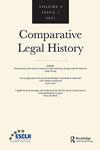战胜有罪不罚现象:1914年以来欧洲国际司法的尝试
IF 0.5
Q2 LAW
引用次数: 1
摘要
在漫长而暴力的二十世纪中,只有少数国际犯罪者受到审判,这个时代的一个核心挑战是努力确保并非所有这些罪行都不受惩罚。这不仅需要建立法律记录,还需要实现正义的勇气、决心和创造性。从20世纪20年代鲜为人知的审判到21世纪初的南斯拉夫法庭,从1914年的比利时到1943年的乌克兰,再到1975年的斯图加特和杜塞尔多夫。它说明了法律语言在多大程度上描绘了国际正义的视野。本文章由计算机程序翻译,如有差异,请以英文原文为准。
Defeating impunity: Attempts at international justice in Europe since 1914
Over the course of the long and violent twentieth century, only a minority of international crime perpetrators ever stood trial, and a central challenge of this era was the effort to ensure that not all these crimes remained unpunished. This required not only establishing a legal record but also courage, determination, and inventiveness in realizing justice. Defeating Impunity moves from the little-known trials of the 1920s to the Yugoslavia tribunal in the 2000s, from Belgium in 1914 to Ukraine in 1943, and to Stuttgart and Düsseldorf in 1975. It illustrates the extent to which the language of law drew an international horizon of justice.
求助全文
通过发布文献求助,成功后即可免费获取论文全文。
去求助
来源期刊
CiteScore
1.70
自引率
0.00%
发文量
20
期刊介绍:
Comparative Legal History is an international and comparative review of law and history. Articles will explore both ''internal'' legal history (doctrinal and disciplinary developments in the law) and ''external'' legal history (legal ideas and institutions in wider contexts). Rooted in the complexity of the various Western legal traditions worldwide, the journal will also investigate other laws and customs from around the globe. Comparisons may be either temporal or geographical and both legal and other law-like normative traditions will be considered. Scholarship on comparative and trans-national historiography, including trans-disciplinary approaches, is particularly welcome.

 求助内容:
求助内容: 应助结果提醒方式:
应助结果提醒方式:


